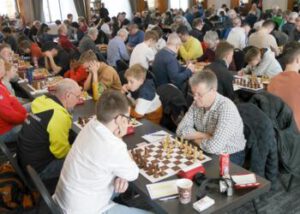Pressemitteilung
The tie-breakers of the first round unfolded very intensively. Two matches were decided in the last seconds.
The first game of the second round of the FIDE Grand Prix organized by World Chess in Riga will take place on Monday.
After Maxime Vachier-Lagrave and Shakhriyar Mamedyarov already secured their qualification in the classical games on Saturday, all eyes turned to the six other pairs. Tie-break matches are disputed on the best of two in successive series. In the first set of two games, both players receive 25 minutes with an increment of 10 seconds per move.
Mr Oliver Bramwell, Chairman o f the Board in the PNB Banka, opened the day with the symbolic first move in the game between Alexander Grischuk and Nikita Vitiugov. This apparently brought luck to Grischuk, as he went on to win a flashy game in 23 moves after sacrificing his bishop on g7 to rip black’s castle open. Vitiugov tried his best in the second game but Grischuk kept control and even refuted his opponent’s attempts. He took a pawn and even won this second game.
f the Board in the PNB Banka, opened the day with the symbolic first move in the game between Alexander Grischuk and Nikita Vitiugov. This apparently brought luck to Grischuk, as he went on to win a flashy game in 23 moves after sacrificing his bishop on g7 to rip black’s castle open. Vitiugov tried his best in the second game but Grischuk kept control and even refuted his opponent’s attempts. He took a pawn and even won this second game.
The main upset of the first round came from the hands of Veselin Topalov. The former World Champion admittedly came to Riga without any ambitions, but he managed to knock out Hikaru Nakamura. Both classical encounters had been very balanced, and so was their first rapid game. In the second, however, the Bulgarian got his type of positions, as he stated afterwards, and kept pressure throughout the game. Nakamura blamed his loss on the hasty move 40…f5, when he forgot that white was not forced to take but could simple bring his king to the centre. Some moves later, in a difficult position, the American blundered a piece.
The match between Wesley So and Pentala Harikrishna took a crazy turn early on in the first game, when the Indian sacrificed a piece and spent a lot of time on his next move. As he explained afterwards, he hesitated between two continuations but understood that his position was worse anyway. Harikrishna nevertheless found a way to muddy waters. The position became so complicated  that with little time on the clock, both players inevitably made mistakes. In the end, Wesley So got the material advantage of rook and two pieces for the queen and eventually converted it. Their second encounter was more much balanced. Harikrishna failed to obtain real chances and had to agree to a draw, synonymous of elimination.
that with little time on the clock, both players inevitably made mistakes. In the end, Wesley So got the material advantage of rook and two pieces for the queen and eventually converted it. Their second encounter was more much balanced. Harikrishna failed to obtain real chances and had to agree to a draw, synonymous of elimination.
The young Jan-Krzysztof Duda managed to knock out Petr Svidler. The Russian praised his opponent in the post-match interview, saying that he had fully deserved victory on this day. “I thought that my chances were favourable in the first game, but Jan-Krzysztof understood the position much better. I even had to be careful”. After this draw, Duda took the initiative early on in the second rapid game and broke his opponent’s resistance in the endgame.
Sergey Karjakin and Anish Giri delivered a fascinating tie-break, exchanging blows in every game. In the first rapid encounter, the Russian clearly dominated in a Sicilian Najdorf. He gained a significant space advantage early on and never allowed his opponent to breathe. In view of Karjakin’s famous resilience, not many believed that Giri would be able to hit back in the second game. But the Dutch star handled this battle perfectly. He achieved some pressure in a Reti Opening and methodically increased his advantage to score the equalizer.
According to the regulations, the next set of two games are played with a shorter time-control, 10 minutes for each player with an increment of 10 seconds p er move. Karjakin missed a huge chance in the second game with black, as he had obtained a winning advantage in the endgame. But when everything seemed clear, he misplaced his king with 62…Ka3 and allowed Giri a miracle save. There followed two blitz games with the time-control of 5 minutes each plus 3 seconds per move. The first was an eventless draw, but the second provided Giri with a definite chance to finish the match, as his far-advanced past pawn on a7 seemed to be decisive. Had he played 38.Kd3 instead of Kf3, he might have won the game. The final tie-break is the so-called “Armaggedon”. White has five minutes at the start of the game against black’s four without increment until the 60th move. Black’s time deficit is compensated for by the fact that a draw guarantees the win of the match. As in a penalty shoot-out at football, anything can happen. Giri picked the black pieces and came out of the opening with an excellent position. But Karjakin did his best to keep it as complicated as possible and succeeded in outplaying his opponent, even delivering a beautiful mate in the end. As he admitted in the post-match interview, this was probably the toughest match he had ever had to play in his career.
er move. Karjakin missed a huge chance in the second game with black, as he had obtained a winning advantage in the endgame. But when everything seemed clear, he misplaced his king with 62…Ka3 and allowed Giri a miracle save. There followed two blitz games with the time-control of 5 minutes each plus 3 seconds per move. The first was an eventless draw, but the second provided Giri with a definite chance to finish the match, as his far-advanced past pawn on a7 seemed to be decisive. Had he played 38.Kd3 instead of Kf3, he might have won the game. The final tie-break is the so-called “Armaggedon”. White has five minutes at the start of the game against black’s four without increment until the 60th move. Black’s time deficit is compensated for by the fact that a draw guarantees the win of the match. As in a penalty shoot-out at football, anything can happen. Giri picked the black pieces and came out of the opening with an excellent position. But Karjakin did his best to keep it as complicated as possible and succeeded in outplaying his opponent, even delivering a beautiful mate in the end. As he admitted in the post-match interview, this was probably the toughest match he had ever had to play in his career.
Yu Yangyi and Levon Aronian also went through a marathon by drawing their first four games of the tie-break. These encounters were all very balanced and only the Chinese managed to get some chances in the fourth game. The break came in the very first blitz. Aronian won two pawns and achieved a huge advantage, only to let it slip into a drawish rook endgame. There are always many ups and downs in this fast time control. In his turn, Yu Yangyi failed to defend and lost. In these situations, mental endurance is paramount. Time is scarce between games to recover from bad blows. The Armenian started well in the second blitz but suddenly collapsed and allowed Yu Yangyi to bounce back. The Chinese picked the black pieces in the final “Armaggedon” and confidently held the draw, thus qualifying to the next round.
Offizielle Seite Fotos: Niki Riga
Round 1, tie-breaks:
Giri – Karjakin 3 – 4 (Armaggedon)
So – Harikrishna 1,5 – 0,5
Duda – Svidler 1,5 – 0,5
Grischuk – Vitiugov 2-0
Yu Yangyi – Aronian 3,5 – 3,5 (Armaggedon)
Topalov – Nakamura 1,5 – 0,5
Round 2 pairings:
Karjakin – So
Duda – Mamedyarov
Grischuk – Yu Yangyi
Topalov – Vachier-Lagrave









More Stories
Weltklasse-Schach in Schleswig-Holstein
London Chess Classic 2023
Alle sind vor dem Ruhetag geöffnet, die Futures laufen bereits
Cairns Cup 2023 – Tag 9
Cairns Cup 2023 – Rückblick auf Tag 8
Cairns Cup 2023 – Rückblick auf Tag 7